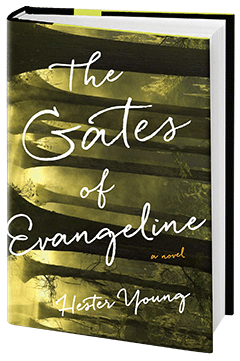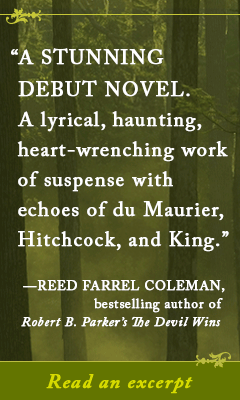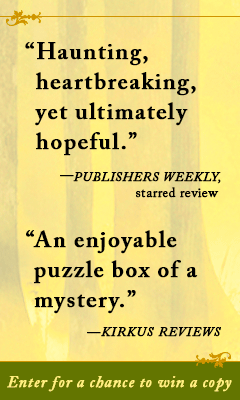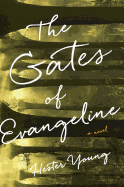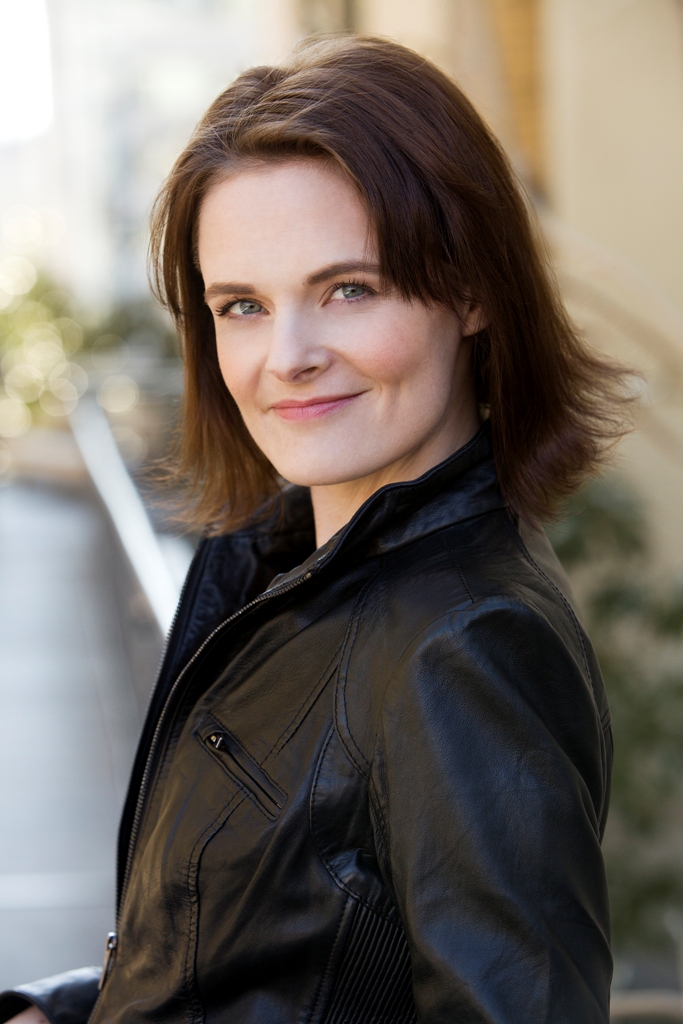 |
| photo: Francine Daveta Photography |
Hester Young holds a Master's degree in English with a concentration in creative writing from the University of Hawai'i at Manoa, and her short stories have appeared in Hawai'i Review and other magazines. Before turning to writing full-time, she was a teacher in Arizona and New Hampshire. Young lives in Lawrenceville, N.J., with her husband and their two children. The Gates of Evangeline is her first novel.
Your grandmother's recurring nightmare and the related death of her son partly inspired The Gates of Evangeline. When did you learn about this?
I knew from a young age that my father's little brother, Bobby, had died tragically at the age of four. For a long time, I viewed this event primarily from my father's perspective--I was the eldest child myself, and the idea of losing a younger sibling was horrifying. It wasn't until I was older that I really began to consider the impact this event must have had on my grandmother.
My grandfather was a very private man, and, following his son's death, he refused to talk about Bobby. He passed away when I was about 18. Once he was gone, my grandmother became much more willing to speak about the darker parts of her life and her history. In my final year of college, my grandmother and I went on a two-week vacation to Florida together. She spoke at length about Bobby, her premonitory dreams of his fatal fall from a window, and the ghostly visitation she received after his death. I had experienced some premonitions myself at that point and was surprised that my skeptical grandmother understood.
As a child, Bobby was often on my mind. The idea of a lost child whose father never spoke his name weighed heavily on me. My grandparents' house had no pictures of this child anywhere, and I remember how strange that seemed to me, his virtual erasure. In the sixth grade, I wrote a story based on Bobby's death, with a first-person narrator loosely modeled after my father. So I guess he's been lingering in my subconscious for a while, waiting for an outlet.
Does anything else have roots in actual events or people? I find it humorous that Charlie has a problem with appropriate dress. Is that you?
To be fair, Charlie dresses appropriately for a fancy dinner party with affluent New Yorkers. She just happens to be dining with Old South aristocracy. I had a similar experience when I moved back to the East coast after living in Hawai'i. I showed up for an interview in a sundress that would've been totally work-appropriate for Oahu but didn't go over so well in New Hampshire. They hired me, but I later saw in my personnel file that my interviewer had noted my "choice of dress was questionable." Lesson learned!
There are several other elements in the novel that come from my own life as well. Charlie's discomfort with guns and horror at discovering her new love interest carries a concealed weapon would be an example. I grew up in Massachusetts, which has some of the most stringent gun control laws in the country. My husband, on the other hand, is a Missouri boy who grew up hunting and, when he lived in a bad section of Flint, Michigan, actually used a shotgun to defend his home from break-ins. Our disparate views on guns definitely required some negotiation early in our relationship!
There's a definite connection to Longfellow's poem "Evangeline."
I would love to say that I read Longfellow's "Evangeline: A Tale of Acadie" and was inspired to write this book, but that's not what happened. I read the poem only after completing the novel. When I got to the section that now appears as an epigraph at the beginning of the book, I got chills--it seemed so directly connected to the story I was telling, without any intention whatsoever.
What about Gabriel as the name of the son, or Evangeline in the title?
Gabriel was always the name of the missing Deveau son, but the estate used to be named "L'Aurore." The title went through several incarnations and then my editor suggested we change the name of the house so that it could serve as our title. We had a terrible time trying to come up with a name for the house at first, and then I said, "You know, I love the name Evangeline, but there's some poem about an Evangeline that's really famous in Louisiana, so we should probably steer clear." I didn't know much about the poem beyond the fact that it existed. When I investigated further and discovered it was a poem about Evangeline's search for the missing Gabriel, then I knew we'd found the right name.
What inspired you to use Louisiana for your setting?
I chose Louisiana because of a dream I had that partially inspired the book. In the dream, I was sitting in a boat in a swamp with a little boy who told me how he died. When I woke up, I wrote down details of this dream and the word "bayou" kept coming to my mind. I felt sure that I had been in Louisiana. That dream now essentially serves as the opening of my novel.
Within months of starting to write this book, three different members of my husband's immediate family moved to Louisiana. Thus, I was lucky enough to have a foothold in the area as my husband and I went on research trips over the next few years.
The setting gives you a firm Southern gothic style. Is that what you were going for?
I was always a dark little child. At 10 or 11, my favorite writers were Lois Duncan, Stephen King, Agatha Christie and Thomas Harris. I became interested in romance writing in my early teens because I liked how formulaic it was; the rules for pleasing your readers seemed so simple. When I finally sat down to write my own novel, I didn't have any particular genre in mind--I just wanted to tell a story that people would enjoy reading. To be honest, I didn't even know Southern gothic was a genre until my agent used the term!
The Gates of Evangeline is the first of a series; has that affected your writing process?
I groped along through the first 60 pages or so with a general idea of what I was doing and where the book had to go. Eventually the details became complex enough that I had to create a chapter summary to help me manage all the plot points. I was never married to my outlines, however. The characters and events continued to evolve throughout the writing process.
When I completed the novel, I felt that readers might still have questions about Charlie, and my editor at Putnam was excited about the idea of a series. Three books give me the space to really develop Charlie and her gift. I'm well into the second book now, and it's been fun to see where life takes her.
How did you research for the book?
Having family members in Louisiana certainly aided in my research. Over the course of a few different trips, my husband and I got to experience Mardi Gras in New Orleans, explore the swamps and some towns in Cajun Country, and visit some old plantation homes. I learned a lot about what it takes to manage these giant estates, which was fascinating. I guess the most memorable part of these visits, however, was also the saddest.
On our very first trip to New Orleans, my husband and I were brimming with excitement over my first pregnancy. The day before I completed my research, I lost the pregnancy. I'll always remember that the midwife who helped me through this loss was named, somewhat fittingly, Katrina. While I would never equate my miscarriage with the kind of loss that Charlie experiences, I will say that losing even just the idea of a child was very painful, and I think it gave me a greater understanding of my protagonist.
As a result of Charlie's loss, she battles with her faith in God, while another character's faith is strengthened after the loss of a child. Where are you on this spectrum?
I am fortunate to know so many strong mothers, and I know that hardship can transform one's faith in many directions. My mother-in-law had a child with brain cancer; her faith and the support of her church community was a source of strength as she fought her way through the long, hard treatments, knowing her son might not survive. Thank goodness he did. On the other hand, one of my best friends had a baby born nearly three months early. Although her own child lived and eventually thrived, she lost her belief in God after watching other premature babies die in the NICU. I think both of these reactions make sense, and I wanted to write a novel that could resonate with people regardless of their religious beliefs.
What has your road to publication been like?
I feel a bit guilty sharing this story with aspiring writers, as it is a hard one to duplicate, but here goes. When I was 19, I interned with the fledgling Zachary Shuster Harmsworth Literary Agency in Boston. By the end of the summer, I had decided two things. One, I would make a terrible literary agent. Two, when I eventually wrote my own novel, I would go to ZSH for representation and obviously my work would be so astoundingly great they would immediately sign me and sell my book and I would live happily ever after as an author. It was the kind of naïve plan that only an arrogant 19-year-old could come up with.
Well, it took 15 years and two English degrees and some published short stories and crazy-making time at home with my son, but I did complete my novel. As planned, I went straight to Esmond Harmsworth, now a well-established agent with an impressive client list. He responded to my e-mail query within 15 minutes, and I signed with him a few weeks later. Fast forward a few months, and I had a three-book deal on my hands with Putnam. The only downside of this whole story is that every time I'm in the presence of my agent, I have this overwhelming urge to fetch him coffee and photocopy something.
What comes next?
I'll take it one book at a time and see how that goes! But, based on setting alone, neither of the two sequels will fall into the category of Southern Gothic. That gives me--and my characters--plenty of room to play.--Jen Forbus



